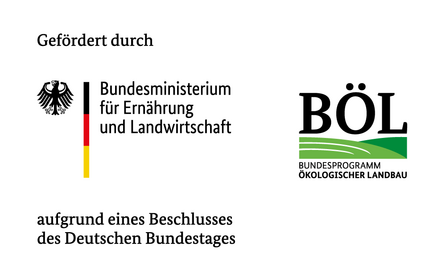HortiPrimed - Priming of tomato young plants as protection against abiotic and biotic stress in the tomato production
Project period
2022 - 2024
The joint project HortiPrimed, which is anchored at the scientific level in Bonn, Geisenheim, Jülich and Munich, started on the first of January 2022 with funding from the BMEL/BÖLN. At the Hochschule Geisenheim University, the yield and stress physiological research activities are coordinated by Dr. Simone Röhlen-Schmittgen from the Department of Vegetable Crops.
Tomatoes produced in greenhouse conditions are exposed to many stresses, many of which are expected to intensify under climate change. To protect these tomatoes against abiotic and biotic stresses, pesticides and also energy and resources must be invested und utilised. Without effective protection, tomato producers experience losses. Professional pre-culturing is often applied to young plants before they are supplied to tomato producers. A pre-treatment of these young plants could provide sustained strengthening for later growth periods. This could provide a large advantage to producers and reduce the sensitivity of the plants against biotic (e.g. fungi or viruses) and abiotic stresses (e.g. heat or cold). Additionally, the need for pesticides and plant or chemical plant strengtheners throughout the production cycle could be reduced.
Past research has demonstrated that plants exposed to even mild stresses are capable of programming molecular ‘memories’ (priming), which support a better adaptation to stresses that follow. These primed plants react better and/or faster to repeated or following stresses.
For this priming to work, chemical markers in the plant´s genome (so-called epigenetic modifications like DNA-methylation) play an important role. The project HortiPrimed seeks to establish priming on young tomato plants as a plant protection method in horticulture. The project will investigate, how priming can be utilised to make plants more robust in the young plants stage and ultimately more tolerant against abiotic and biotic stresses throughout the rest of the horticultural production stages. Should this be effective, the procedure could be transferred to other horticultural greenhouse production systems. The overall project is coordinated by Dr Anika Wiese-Klinkenberg from IBG-4 at Forschungszentrum Jülich.
At Hochschule Geisenheim University (HGU), Department of Vegetable Crops, the effect of priming on tomato plants under commercial-like production conditions will be investigated by Dr. Simone Röhlen-Schmittgen and her group. For this, procedures and techniques for the application and simulation of abiotic stresses in the greenhouse will be established and used. Plant stress responses will be quantified by phenotyping techniques. At the institutes department IBG-4 (Bioinformatic) in Juelich, the impact of abiotic stress treatments on the induction of priming in young tomato plants will be investigated under the direction of Dr. Anika Wiese-Klinkenberg. The intensity of the stresses is quantified by various phenotyping technologies, also for better establishment of reproducible stress treatments. Subsequently, early effects of priming on the stress tolerance of young tomato plants will be investigated also on the level of gene expression and plant metabolism to understand the underlying molecular mechanisms. Under the guidance of Dr. Martin Groth epigenetic modifications, which are induced by the priming stress and provide a long term ‘memory’ and stress tolerance in the plants will be investigated at the Institute for Functional Epigenetics (IFE) at Helmholtz Zentrum Muenchen. Using molecular techniques, the efficiency and mechanism of priming will be investigated and characterized for its use in plant protection. The group of Dr. Corina Vlot-Schuster at the Institute for Biochemical Plant Pathology (BIOP) of Helmholtz Zentrum Muenchen will investigate the impact of abiotic priming treatments on the biotic stress tolerance of young tomato plants. Phenotyping technologies will be utilised which will allow for the quantification of tolerances. Further, plant responses to priming and subsequent biotic stress will be characterised on the level of gene expression. Dr. Cory Whitney from the Institute of Crop Science and Resource Conservation (INRES) at the University of Bonn will provide modelling tools to help make forecasts about the possible pay-off of priming procedures. Together with project partners and practitioners, the team will generate holistic impact pathway models to illustrate important interactions and all related uncertainties in the processes and conditions of applying priming in tomato fruit and young plant production.
HortiPrimed is accompanied and advised by a board of practitioners in horticulture representing the different sectors of tomato production (Gipmans, Vitarom und Gartenbau Hoffmann) and also involves the Chamber of Agriculture North Rhine-Westphalia and the Hessen Department of Agriculture (LWK-NRW Experimental Centre Horticulture Straelen und Horticultural Centre Geisenheim) as well as the Centre of Competence for Horticulture (KoGa). With this advisory board, developed procedures of the project can be close to practice and best integrated into tomato production.
The project HortiPrimed is supported by funds of the Federal Ministry of Food and Agriculture (BMEL) based on a decision of the parliament of the Federal Republic of Germany via the Federal Office for Agriculture and Food (BLE) under the Federal Programme for Ecological Farming and Other Forms of Sustainable Agriculture.






